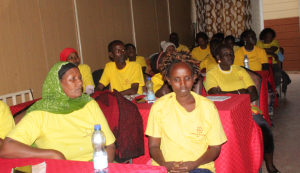A Community Based Organization has devised innovative ways of reaching out to pastoralists living in remote areas of Northern Kenya to preach on family planning by using camels.
Communities Health Africa Trust (CHAT), a Kenyan based institution has been using camels to access impassable roads in Northern parts of Kenya to train women about family planning methods, economic sustainability ways, all aimed at reducing teenage pregnancy and poverty among communities. Apart from camels, they use boats in far-flung areas of Nyanza region

Over sixty thousand women have been trained on contraceptive methods of their choice with a whopping forty thousand indigenous women prioritizing usage of three to five years planning methods.
However, the journey hasn’t been a walk in the park since some indigenous pastoralists’ communities in Northern Kenya are opposed to modern family planning methods as Ms Madina Dima from Isiolo County notes.
“As a Muslim community, we are not familiar with family planning, men are the ones who decide how many kids to have, due to that, some kids die because of hunger since there are many,” says Ms Dima.
She says that, for the longest time, men are the key decision makers in a family set up and hence leaving them with no choice of how to use family planning methods that led to an increase of poverty, teenage pregnancy and early marriages among those communities.
According to Kenya National Bureau of Statistics (KNBS) 2022 Demographic and Health Survey, it shows that of Marsabit, Tana River, West Pokot, Samburu, Siaya and Isiolo have the highest unmet needs of family planning, with 38 per cent, 34, 30, 29, 27 and 27 per cent in all the six counties respectively.
In Nyanza region, Emily Aoko reveals that women and young girls trade sex for fish along Lake Victoria which contributes to increase of sexual transmitted diseases (STIs), however, with CHAT, they have been able to tame the menace by sensitizing residents on the need to use contraceptives and seek alternative sources of livelihoods to kick out poverty.
Ms Aoko, who is now a community health volunteer in Homabay County, Nyanza, reveals that earlier days, ignorance among people from her region was high and she could not speak about family planning methods publicly.
“By the time we started, ignorance was high, I could not even talk about family planning, I thank God people are now embracing the changes. They even prefer long term methods of family planning,” reveals Ms Aoko.
She says that, with intensified effort on sensitizing women about family planning, they are now embracing it and seeking long term methods.
Lucy Musyoka, from Kitui County, on her part notes, religion is a major setback on family planning among residents, a war they are determined to win.
Ms Musyoka, who is also a community health volunteer in Mwingi North, urges people to shun traditional family planning methods for prosperity.
She trains people on SGBV advocacy and links women with nearest health facilities to access family planning services.
She appeals for adequate supply of contraceptives from the government to evade her constituent from suffering due to lack of that precious family planning commodities.
CHAT programme Manager Ms Rose Kimanzi, speaking in Nanyuki, Laikipia County during a sensitization forum that had brought together women from 29 counties of Western, Central, Northern and Eastern region noted that they are committed in providing health services and especially family planning to vulnerable rural communities which she said are hard to reach due to bad roads.
She added that they use camel strategy, boat and back pack mobile clinics where they visit each family in need of family planning services and at the same time as they seek to create awareness on embracing modern family planning methods.
Laikipia East Assistant County Commissioner Kimberly Champagne said the government is committed to working with other key stakeholders on ending early teenage pregnancies in the country.
“We have been able to equip them with policy skills about SGBV, risk factors and have community leaders who can play a role in making sure that SGBV cases don’t go unreported,” says Ms Champagne.
At the same time, the ACC urged SGBV victims not to shy away from reporting when they are assaulted, noting the government would take stern action against the culprits.
The ACC further appealed to Laikipia residents to take advantage of Policare, a one stop shop for SGBV, she noted the facility had doctors, therapists, judiciary to support the victims.
By Muturi Mwangi




